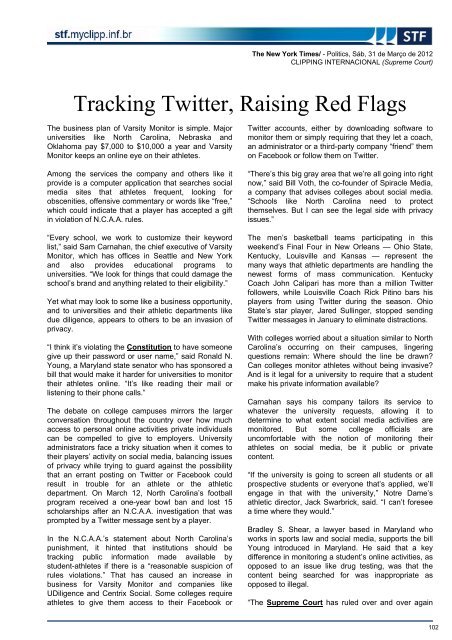STF na MÃdia - MyClipp
STF na MÃdia - MyClipp
STF na MÃdia - MyClipp
Create successful ePaper yourself
Turn your PDF publications into a flip-book with our unique Google optimized e-Paper software.
The New York Times/ - Politics, Sáb, 31 de Março de 2012<br />
CLIPPING INTERNACIONAL (Supreme Court)<br />
Tracking Twitter, Raising Red Flags<br />
The business plan of Varsity Monitor is simple. Major<br />
universities like North Caroli<strong>na</strong>, Nebraska and<br />
Oklahoma pay $7,000 to $10,000 a year and Varsity<br />
Monitor keeps an online eye on their athletes.<br />
Among the services the company and others like it<br />
provide is a computer application that searches social<br />
media sites that athletes frequent, looking for<br />
obscenities, offensive commentary or words like “free,”<br />
which could indicate that a player has accepted a gift<br />
in violation of N.C.A.A. rules.<br />
“Every school, we work to customize their keyword<br />
list,” said Sam Car<strong>na</strong>han, the chief executive of Varsity<br />
Monitor, which has offices in Seattle and New York<br />
and also provides educatio<strong>na</strong>l programs to<br />
universities. “We look for things that could damage the<br />
school’s brand and anything related to their eligibility.”<br />
Yet what may look to some like a business opportunity,<br />
and to universities and their athletic departments like<br />
due diligence, appears to others to be an invasion of<br />
privacy.<br />
“I think it’s violating the Constitution to have someone<br />
give up their password or user <strong>na</strong>me,” said Ro<strong>na</strong>ld N.<br />
Young, a Maryland state se<strong>na</strong>tor who has sponsored a<br />
bill that would make it harder for universities to monitor<br />
their athletes online. “It’s like reading their mail or<br />
listening to their phone calls.”<br />
The debate on college campuses mirrors the larger<br />
conversation throughout the country over how much<br />
access to perso<strong>na</strong>l online activities private individuals<br />
can be compelled to give to employers. University<br />
administrators face a tricky situation when it comes to<br />
their players’ activity on social media, balancing issues<br />
of privacy while trying to guard against the possibility<br />
that an errant posting on Twitter or Facebook could<br />
result in trouble for an athlete or the athletic<br />
department. On March 12, North Caroli<strong>na</strong>’s football<br />
program received a one-year bowl ban and lost 15<br />
scholarships after an N.C.A.A. investigation that was<br />
prompted by a Twitter message sent by a player.<br />
In the N.C.A.A.’s statement about North Caroli<strong>na</strong>’s<br />
punishment, it hinted that institutions should be<br />
tracking public information made available by<br />
student-athletes if there is a “reaso<strong>na</strong>ble suspicion of<br />
rules violations.” That has caused an increase in<br />
business for Varsity Monitor and companies like<br />
UDiligence and Centrix Social. Some colleges require<br />
athletes to give them access to their Facebook or<br />
Twitter accounts, either by downloading software to<br />
monitor them or simply requiring that they let a coach,<br />
an administrator or a third-party company “friend” them<br />
on Facebook or follow them on Twitter.<br />
“There’s this big gray area that we’re all going into right<br />
now,” said Bill Voth, the co-founder of Spiracle Media,<br />
a company that advises colleges about social media.<br />
“Schools like North Caroli<strong>na</strong> need to protect<br />
themselves. But I can see the legal side with privacy<br />
issues.”<br />
The men’s basketball teams participating in this<br />
weekend’s Fi<strong>na</strong>l Four in New Orleans — Ohio State,<br />
Kentucky, Louisville and Kansas — represent the<br />
many ways that athletic departments are handling the<br />
newest forms of mass communication. Kentucky<br />
Coach John Calipari has more than a million Twitter<br />
followers, while Louisville Coach Rick Pitino bars his<br />
players from using Twitter during the season. Ohio<br />
State’s star player, Jared Sullinger, stopped sending<br />
Twitter messages in January to elimi<strong>na</strong>te distractions.<br />
With colleges worried about a situation similar to North<br />
Caroli<strong>na</strong>’s occurring on their campuses, lingering<br />
questions remain: Where should the line be drawn?<br />
Can colleges monitor athletes without being invasive?<br />
And is it legal for a university to require that a student<br />
make his private information available?<br />
Car<strong>na</strong>han says his company tailors its service to<br />
whatever the university requests, allowing it to<br />
determine to what extent social media activities are<br />
monitored. But some college officials are<br />
uncomfortable with the notion of monitoring their<br />
athletes on social media, be it public or private<br />
content.<br />
“If the university is going to screen all students or all<br />
prospective students or everyone that’s applied, we’ll<br />
engage in that with the university,” Notre Dame’s<br />
athletic director, Jack Swarbrick, said. “I can’t foresee<br />
a time where they would.”<br />
Bradley S. Shear, a lawyer based in Maryland who<br />
works in sports law and social media, supports the bill<br />
Young introduced in Maryland. He said that a key<br />
difference in monitoring a student’s online activities, as<br />
opposed to an issue like drug testing, was that the<br />
content being searched for was i<strong>na</strong>ppropriate as<br />
opposed to illegal.<br />
“The Supreme Court has ruled over and over again<br />
102











